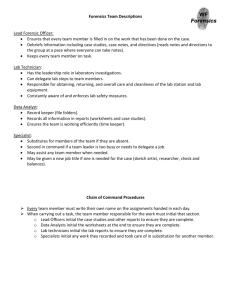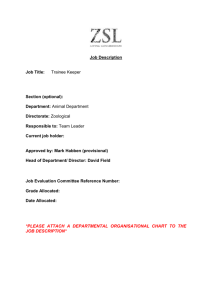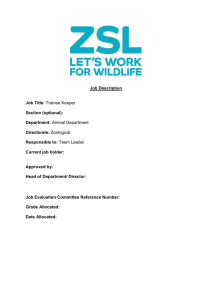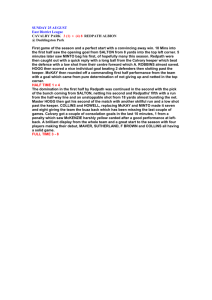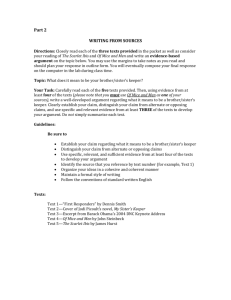Marvin Ray Burns
advertisement
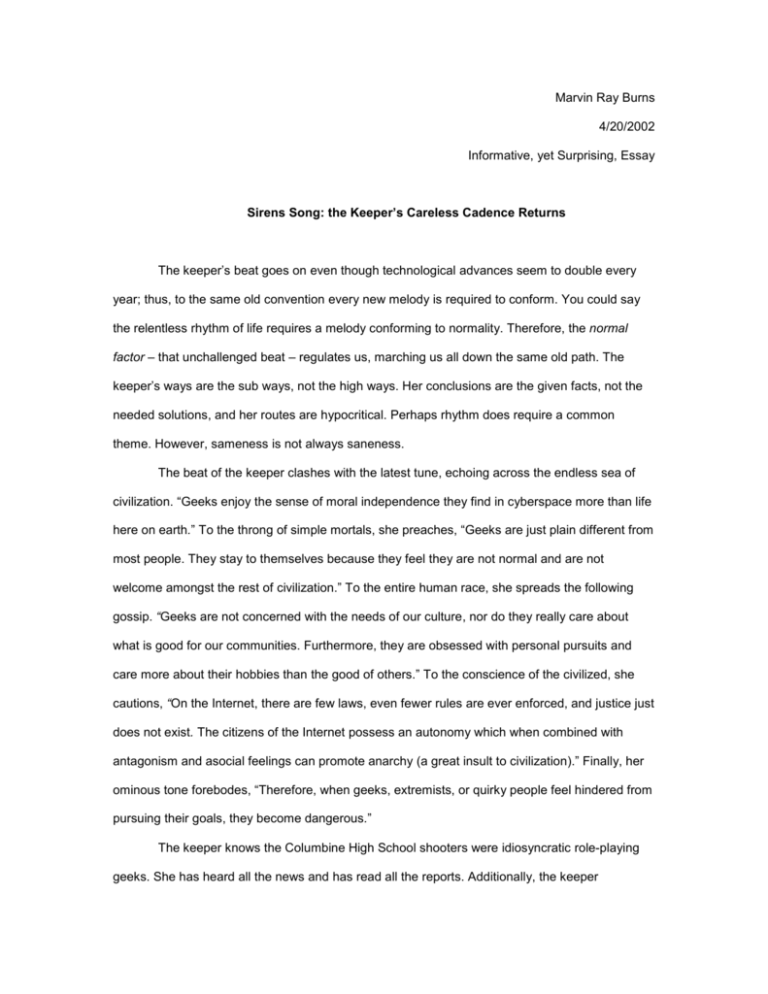
Marvin Ray Burns 4/20/2002 Informative, yet Surprising, Essay Sirens Song: the Keeper’s Careless Cadence Returns The keeper’s beat goes on even though technological advances seem to double every year; thus, to the same old convention every new melody is required to conform. You could say the relentless rhythm of life requires a melody conforming to normality. Therefore, the normal factor – that unchallenged beat – regulates us, marching us all down the same old path. The keeper’s ways are the sub ways, not the high ways. Her conclusions are the given facts, not the needed solutions, and her routes are hypocritical. Perhaps rhythm does require a common theme. However, sameness is not always saneness. The beat of the keeper clashes with the latest tune, echoing across the endless sea of civilization. “Geeks enjoy the sense of moral independence they find in cyberspace more than life here on earth.” To the throng of simple mortals, she preaches, “Geeks are just plain different from most people. They stay to themselves because they feel they are not normal and are not welcome amongst the rest of civilization.” To the entire human race, she spreads the following gossip. “Geeks are not concerned with the needs of our culture, nor do they really care about what is good for our communities. Furthermore, they are obsessed with personal pursuits and care more about their hobbies than the good of others.” To the conscience of the civilized, she cautions, “On the Internet, there are few laws, even fewer rules are ever enforced, and justice just does not exist. The citizens of the Internet possess an autonomy which when combined with antagonism and asocial feelings can promote anarchy (a great insult to civilization).” Finally, her ominous tone forebodes, “Therefore, when geeks, extremists, or quirky people feel hindered from pursuing their goals, they become dangerous.” The keeper knows the Columbine High School shooters were idiosyncratic role-playing geeks. She has heard all the news and has read all the reports. Additionally, the keeper understands sociology. She knows they lived in their own world, by their own rules and solely for the attainment of their own diabolical goals. She finds with judicial equity, the angry Trench Coat Mafia solved their problems in ragtime, with death, fear, and the disruption of the sense of security for students and faculty all across our country. The keeper teaches us: geeks and other extremists are responsible for many other atrocities like the Columbine massacre. Even before the commission of the crime, the keeper realized the soon-to-be-murderers were different. Indeed, her prejudgment, if acted upon, could have identified the killer kids and helped prevent some of the ruin. Hence, it is not surprising when the keeper begins to single out and profile the unconventional and geek-natured people. Take for an example how the keeper encourages grade school teachers to identify the kids that other children tease the most, and consider the teased kids to be potential threats to the school. In spite of the keeper’s good intentions and her above-mentioned obvious reasons for concern, perhaps most of us really do not wish to harm or even embarrass people who are different, and our prejudices are merely subconscious. Even though there are good reasons for profiling people who have an evil past or are members of destructive groups, to prejudge kids just because they have been teased and hence they might want to strike back is cruel, to say the least. Being different is a two party crime. Weird is only weird because normal is so damned normal! Consider the status of geeks. Are geeks very different from the rest of us? That there is a classification “geeks” indicates that the geeks have crossed a line, in their lifestyle deserving of distinction. What makes them different? Then again, if they are not different from most people, then why do we stereotype them as being nerdy? Whatever our logic or motives are, geeks often feel humiliated and unwelcome among the populace. Why do we make fun of and stereotype geeks? In other words, why does the keeper guard the gates of normality with such bigotry? It would be easy to say, “The victimization of geeks is all in their own imagination; they separate themselves from society and they simply imagine the prejudice.” However, the answer is not that simple. As the geeks sink deeper into their own subculture, at our best, most of us carelessly turn the other way as they drown. Such 2 uncaring treatment often serves only to anger geeks, and to drive them further into their quirky behavior. The aimlessness and anarchism demonstrated by many geeks is a symptom of a grievous disease, but the geeks are not sick! The keeper attends so obsessively to the afflictions of the fringe that she does not realize her own terminal illness. I am talking about a disease of civilization itself. The keeper, in accusing and not helping, is as guilty as the extremists who participate in violence. I even dare propose that the students who tease soon-to-be-childhood felons into reprisal are just as guilty as the kids who do crimes. When computer geeks act out and unleash destructive viruses, there exist unresolved issues with society that drove them into their destructive behavior. Since love for others is no longer a valued trait, civilization (she) breaks down and degrades to the point where she can no longer hold people together. Once upon a time, she gave tenuous harmony, gently arranging the pieces of diversity safely into the medley of life. However, without love, she ceases to be the giver of melody and becomes the keeper of rhythm. Without mutual esteem, she ceases to be the giver of diversity and becomes the keeper of normality. Without benevolence in society, her rhythmic charms enchant the minds of people, controlling, conquering, and just plain conning. As the keeper expels those that are strange from the social order, figuratively, the keeper’s eye convinces her ear the body has no need of it. The sad fruit of ill will is that all the education, research, and discipline we have laboriously worked into the bars of life fall octaves below the bass clef, and they become nothing more than distant thunder. Only after we put away the keeper’s seductive rancor can we make any difference in helping geeks rise above their rebellious tendencies and soar with wings of usefulness. The advantage of muting the song of the keeper is evidenced in Jon Katz’s book Geeks, when two Geek Club members, Sam and Joe, found self-worth in applying their talents on the school computers, Katz writes, “Technophobic school districts turned to their one time social outcasts to help run their computer systems” (Katz 30). In that spirit, Coach Brown cleverly participated in the lives of the geeky foursome and worked hard to get them to feel secure about themselves. He was fulfilling a need in their lives. By giving a home to the Geek Club, he was building a family. In 3 some adoptive sense, he was becoming a father (Katz 27). As any father ought to do, Mr. Brown worked to help these students to find some sense of belonging. The fact is civilization can function efficiently only the same domestic sense of Mr. Brown’s Geek Club. Only when people from all lifestyles, social strata, and backgrounds work toward a mutual vision of orderliness, will the subtle harmonies of civilization blend into the jazz of life. For an example, in Katz’s Geeks, as Jesse makes the effort to form workplace relations, for the first time in his life he becomes aware of a social life (Katz 123). Using my analogy of music, each one of Jesse’s coworkers has his or her particular line of talent to sing. As a tenor singing Handel’s Messiah, feeling incomplete in one self, he or she seeks the other’s company after work hours, to blend their individual parts into a concert of acquaintance. Together, they catch the keeper off guard and the result is a sweet evening of harmony. Whether the keeper has any right to lead is not theirs to say. Nevertheless, how they respond to her hypnotic march is their choice. The keeper is a poor director. She conducts every song in the same old 4/4. She only knows one song – The Death March – all die, everything ends and what all was done is done. Most critical, the keeper knows nothing of discovery. She dares not try; nothing new is attempted. Why does she play no new song? Because the keeper knows new is scary. Scary is bad, and the keeper is fear. The keeper’s echo finally comes full circle. Geeks enjoy the sense of moral independence more than life itself because they see very little sincere morality in this life. They stay to themselves because they feel they should not behave normal in a world that is abnormal. Perhaps it is true on the Internet, there are few laws, even fewer rules enforced, and justice just does not exist, simply because justice really does not exist. The citizens of the Internet possess an autonomy which when combined with antagonism and asocial feelings can promote anarchy, a great reflection of how most of us live (in secret). Therefore, when geeks, extremists, or quirky people feel hindered from pursuing their goals, they become dangerously aware of our inner felon. It is not surprising when the keeper begins to single out and discriminate against geeknatured people, because they are a reflection of her, and she has no ear for that sound. Perhaps 4 most of us really do not wish to discriminate against ourselves, but when we march to the beat of the keeper, we already have. 5 WORKS CITED Katz, Jon. Geeks: How Two Lost Boys Rode the Internet Out of Idaho. New York: Broadway Books, 2000. Marvin Ray Burns 4/22/2002 Writer’s Statement for the Final Informative, yet Surprising, Essay Using a reversal pattern to form a thesis, I was to write an informative and surprising essay, in contrast to common opinions. Having difficulty in honestly discerning exactly what opinions are the most widely held, and not having time to take a survey, I relied solely on my own opinions. Back during the writing of my assignment two, the strong response, I underwent a significant opinion clarification. Upon first reading Jon Katz’s Geeks, I was somewhat up in arms about how Katz wrote in such detail about the frustration many geeks felt in not being able to fit into society, without exploring how to help them fit in. I deemed it insufficient to know how someone feels. I reasoned knowledge leads to pride; selfless work tends to help. Therefore, in writing my strong response, I began to clarify in my mind in what ways extremists could become useful members of society. In this Informative, yet Surprising, Essay (having had a rather narrow viewpoint of geeks and extremist) I hope to amplify the opinion of my readers, as to the role geeks play in our societal structure. Although there was a prewriting portion to this assignment, I could get a head start in writing this essay by outlining it with my opinions about society and geeks before the writing of assignment two. Hence, assignment two became the outline for this essay. However, I did put great effort into the prewriting assignment; it was a critical tool, to keeping this assignment from looking just like assignment two. Enclosed, in the Heuristics Log, are the portions (titled Cuts) that I started with. Next, it was time to answer some questions from The Allyn and Bacon Guide to 6 Writing concerning an informative essay. My answers to the questions are also enclosed. In short, I submitted to the long process and learned from it. The original title of this assignment was “Charlatans’ Cosmos,” accusing the social system of being hypocritical. “Charlatans” was plural and possessive because we all are guilty of being a part of a system that generates rebellion. I was dissatisfied with that title because something was missing. However, what is missing? I am missing something, and that something is I. Then again, I really am not missing something; something is missing me. The system that I use to make my social judgments never asked as to how my judgment turns out. The “system” – the keeper only cares about what has happened, not what is happening. As my essay so pessimistically says, “all die, everything ends and what all was done is done.” That logic might be hard to follow, but realize the keeper’s ways are the old ways, not the new ways. Her conclusions are the given facts, not the needed solutions. Her routes are the hypocritical highways not the straight paths. The next thing I did in preparing this assignment for the final was to give a lot of meditation to the phrase, “a system that generates rebellion”. As I closed my eyes, visualizing the system as a person, she stood exposed for the charlatan that she is. Eventually, I could clearly see that for as long as the human race has depended on the system called civilization, she has carelessly continued to write laws in stone and used those stones to clobber all who departed from the “norm”. Hence, in revising this Final assignment, all I did was to let her (the siren of civilization) out of my imagination. Like Aladdin in the Arabian Knights, I rubbed the lamp and out came the genie, or in my case, the keeper. In order to describe the keeper I inquired: What is normal? What are the social norms? The answer was an epiphany: although we have bona fide reasons for fearing the fringe of humanity, our normality makes them weird. I simply gave life to this great temptress. We call her society; she is the keeper of civilization, the keeper of order, the keeper of the keys of heaven and hell on earth. I wrote concerning her musical charms with which she divines the minds of people in order to control, conquer, and just plain con. 7 This essay might be a little too figurative. However, if the reader carefully considers the story then he or she should understand the point that all of us, geeks and norms, are part of one body. The extremist and the average are the same. We are both the victim and the aggressor. Both of us are the subject and the ruler. Together we are the keeper. 8
